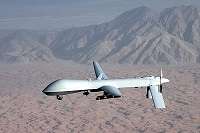As Debate over Drones Grows Louder, White House Wants to Expand War on Terror
Or rather, the White House wants documented authorization of essentially what it's already doing

During Sen. Rand Paul's filibuster yesterday he discussed President Barack Obama's use of drones in the execution of U.S. citizen (and suspected al Qaeda recruiter) Anwar al-Alwaki and the subsequent killing of his 16-year-old son in Yemen. Paul has expressed concern about the lack of due process in this situation before, as Jacob Sullum has noted, but he doesn't object to the military drone program. His stated goal is to make sure that the use of drones on American citizens is compliant with the Fifth Amendment.
Today Spencer Ackerman of Wired, whose coverage of drones Paul also read from the Senate floor yesterday, analyzes a Washington Post report that the Obama Administration is considering calling for changes to the Authorization of Military Force (AUMF) document that launched the nation's war on terror. The AUMF document tied the allowance of force to terrorism suspects who could be directly connected to the 9/11 attacks and those offering them assistance. With a dearth of suspects left to target, the administration wants to possibly expand the AUMF to cover other possible terrorist organizations with little connection to al Qaeda, like those believed to be responsible for the attacks on the U.S. consulate in Benghazi, Libya.
Ackerman notes that it's not as though the current AUMF has actually limited the Obama Administration's actions in any way as it stands:
"The current AUMF already authorizes broad war powers to the president. As Sen. Rand Paul (R-Ky.) noted in his filibuster of impending CIA director John Brennan Wednesday, it establishes a "war with no temporal limits" or geographic ones. In Pakistan, the U.S. doesn't just launch drone strikes and commando raids against core al-Qaida remnants, it also kills unknown individuals believed to fit a terrorist profile based on observed pattern-of-life behavior. The CIA and Joint Special Operations Command are also waging a campaign against al-Qaida's Yemen-based affiliate, an "association" never mentioned in the AUMF, albeit against an organization that has unsuccessfully attempted to attack the U.S. at home. Even in Yemen, the U.S. also carries out so-called "signature strikes" against anonymous targets. Sen. Lindsey Graham (R-SC) recently said that the drone strikes have killed 4,700 people, orders of magnitude more than were involved in the 9/11 conspiracy and core al-Qaida.
But if these campaigns have strained the authorities underscored by the AUMF, practically no one in Congress has objected, either on legal or strategy grounds. In fact, as Rep. Buck McKeon (R-Calif.) pointed out in 2010, more than half the legislators who voted for the AUMF in 2001 are no longer even in Congress, yet the wars persist while the adversary morphs. Changing that dynamic to constrain the war will be a major test of the durability and influence of the civil-liberties coalition that Paul's filibuster seemed to inspire."
Ackerman adds that the Obama Administration originally resisted changes to the AUMF for fear that the House would expand the War on Terror. Now it appears they may be coming on board with the idea.
Reason didn't get the name-checking Wired did from Paul yesterday (not that they don't deserve it – we regularly link to their drone reporting at Reason 24/7), but you can read our drone coverage here.


Show Comments (3)